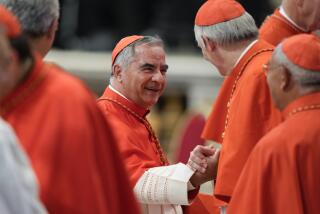Italian Magistrates Issue an Arrest Warrant for Chairman of Olivetti : Scandal: Carlo de Benedetti, one of the country’s richest men, is sought in probe involving more than $6 million in payoffs to government officials.
ROME — Magistrates in Rome investigating a corruption scandal of payoffs for public contracts issued an arrest warrant Saturday for business world icon Carlo de Benedetti, the Olivetti chairman who is one of the richest men in Italy.
The 59-year-old De Benedetti, an engineer by training who transformed Olivetti into one of Europe’s premier computer and telecommunications companies, is the most prominent private business leader to be ensnared in the growing scandal called Tangentopoli (Kickback City), which has tarred more than 2,000 businessmen and political figures.
Italian national police said De Benedetti was sought in an investigation involving more than $6 million in payoffs to officials of the Post and Telecommunications Ministry for the purchase of Olivetti equipment.
Still, the arrest warrant signed by Magistrate Maria Teresa Cordova came as a surprise. Normally, senior managers and politicians are summoned for questioning before a warrant is issued.
De Benedetti, a native of Turin who worked at his offices in Milan on Friday, was not at his home in northern Italy when police arrived Saturday to serve the warrant. One Italian news agency said he had left the country by private jet, but the CIR group, the holding company De Benedetti heads, said in a statement that he would be available Tuesday. Monday, All Souls Day, is a public holiday in Italy.
The principal tangenti inquiry is centered on Milan, where the scandal first surfaced 20 months ago. But Saturday’s warrant was issued by magistrates in Rome investigating De Benedetti and at least three others for paying and receiving bribes at the ministry between 1988 and 1991.
“I am completely puzzled by the warrant because De Benedetti has recently displayed his willingness to cooperate with investigating magistrates,” his lawyer, Marco de Luca, said in a statement Saturday. “He even appeared voluntarily to give information which led to a great trail of investigations in many sectors of the public administration.”
De Benedetti, whose companies range from computers to manufacturing to finance and publishing, is no stranger to the Italian justice system. He is appealing a six-year prison sentence for participating in the fraudulent bankruptcy of a bank where he was briefly deputy chairman in 1982.
In May, De Benedetti testified that his companies had paid more than $7 million to political parties as kickbacks for telecommunications contracts. Olivetti’s standing in the marketplace and the well-being of its employees required payments that amounted to virtual blackmail demanded by political parties controlling state spending, De Benedetti said at the time.
The unfolding scandal has made plain that Italy’s political Establishment came to accept payoffs as its due. Magistrates have traced millions of dollars worth of kickbacks that went to finance the parties and, in many cases, to line the pockets of individual political figures. By now, every major political party has been scarred by scandal, and, amid a torrent of public disgust, Italy is limping toward elections in the spring that should prove the most dramatic since World War II.
Italy’s biggest companies have been drawn into the network of scandal, which is being investigated by magistrates in virtually every major city.
De Benedetti and Fiat’s managing director, Cesare Romiti, were among more than 60 suspects named earlier this month by magistrates investigating contracts awarded to a consortium that is building an extension of Rome’s subway system.
A number of senior Fiat managers have been questioned in Milan investigations, and Raul Gardini, the former head of the chemical conglomerate Ferruzzi Group, shot himself last summer a few hours before he was to have been taken into custody.
Directors of state-owned enterprises have been targets of investigators who have shown a greater willingness to jail the businessmen who paid the bribes than the politicians who expected and accepted them.
More to Read
Sign up for Essential California
The most important California stories and recommendations in your inbox every morning.
You may occasionally receive promotional content from the Los Angeles Times.










